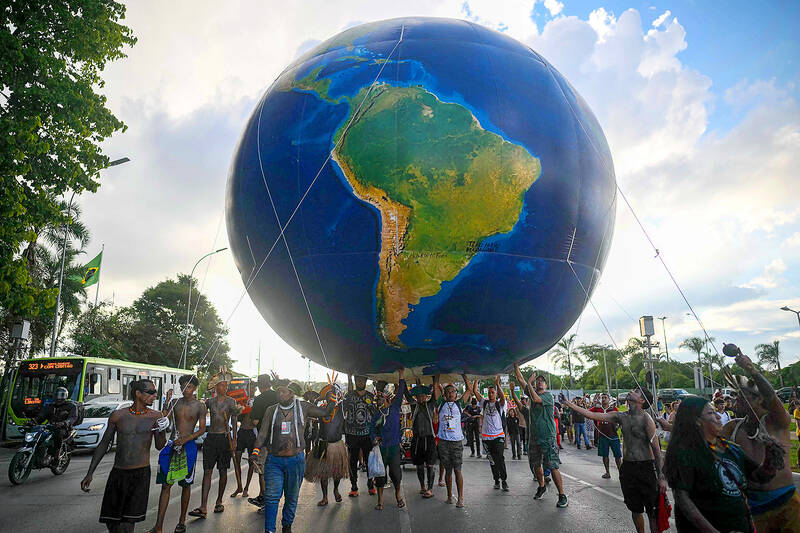How much of a US$450 pot would you give to a charity that cuts carbon emissions by investing in renewable energy, and how much would you keep for yourself? That was the question posed in a recent academic experiment. The answers mattered: real money was handed out as a result to some randomly chosen participants.
The average person gave away about half the money and kept the rest. But what if you had been told beforehand that the vast majority of other people think climate action is really important? Might you have given more to the charity?
That is what a second experiment tested. Before dividing the cash, these participants were told that 79 percent of people thought citizens should try to fight the climate crisis. This mattered, because in earlier questions people had significantly underestimated the proportion at just 61 percent. Being informed about the true level of support boosted the donations by US$16 for each person.

Photo: AFP
The experiment was in the US, but the illusion that climate action is not popular is global. So imagine dispelling that myth: such a shift, experts say, could be a gamechanger, pushing the world over a social tipping point into unstoppable climate progress.
Such a communication campaign, low-cost and scalable, could be among the most powerful tools available to fight the climate crisis, they say. Decades of psychological research indicates that correcting such misunderstandings can change people’s views across a swathe of issues, from participating in protests to voting for Donald Trump.
“We’re sitting on an enormous potential climate movement,” said Anthony Leiserowitz, at Yale University in the US. “It’s latent. It hasn’t been activated or catalyzed. But when you break through these perception gaps, you help people understand that they’re not alone and there is in fact a global movement.”

Photo: AFP
SILENT MAJORITY
The research started with a simple goal, says Teodora Boneva, at the University of Bonn, Germany, who with colleagues undertook the experiments: “We wanted to make a difference to the world. So we asked ourselves, as social scientists and economists: what kind of research can we do?”
Their biggest result was a huge, globe-spanning survey that revealed the remarkable fact that people across the world are united in wanting action to fight the climate crisis but remain a silent majority, because they wrongly think only a minority share their views.

Photo: AFP
“Before, just like everyone else, we would have underestimated the support,” she says. “So when we saw the numbers coming in, we thought: ‘Wow!’ We had no idea we would find such consistent patterns in so many countries.”
The team found 89 percent of people across the world wanted their national governments to do more to fight global heating. More than two-thirds said they were willing to give 1 percent of their income to fight the climate crisis. Crucially, however, they thought only a minority of other people — 43 percent — would be willing to do the same.
The survey involved 130,000 people in 125 countries, which account for 96 percent of the world’s carbon emissions, and was published in the journal Nature Climate Change. People in China, the world’s biggest polluter, were among the most concerned, with 97 percent saying its government should do more to fight the climate crisis and four out of five willing to give 1 percent of their income. The world’s second biggest polluter, the US, was near the bottom, but still had three-quarters of its citizens saying its government should do more and almost half willing to contribute.
Even in the petrostates of Saudi Arabia and the United Arab Emirates, the vast majority — about 80 percent — were willing to give 1 percent of their income to climate action. How many of these wanted more government action is unknown: these countries did not allow the question to be asked.
Those feeling the heat most directly had the strongest pro-climate views. Those in rich countries were significantly less willing to contribute 1 percent. And the countries where people most strongly wanted to fight the climate crisis had implemented significantly more climate policies, the researchers found. The more strongly people believed their fellow citizens would contribute their money to climate action, the more likely they were to give themselves, as Boneva’s later experiments with the US$450 pots showed.
“These positive interactions suggest that a change in one factor can unlock potent, self-reinforcing feedback cycles, triggering social-tipping dynamics,” the team concluded. “Our results suggest a concerted effort to correct these misperceptions could be a powerful intervention, yielding large, positive effects.”
DEEP DESIRE
A single survey, such as Boneva’s, is fascinating — but perhaps you are thinking it could be a freak result. It is not. Many large studies have shown that the public desire for climate action is deep and global, and that the misperceptions that fuel a “spiral of silence” on climate are found wherever researchers look.
A UN poll last year — dubbed the People’s Climate Vote — questioned 75,000 people in countries representing 90 percent of the global population. It found 80 percent wanted their countries to strengthen their climate commitments. Another recent survey of 40,000 people in 20 of the world’s most polluting countries found that 86 percent of people thought the same.
How the question is phrased can change, but people’s hunger for climate action does not. A survey of 140,000 people in 187 countries and territories by the Yale Program on Climate Change Communication asked how high a priority climate change should be for the government of their country: 89 percent of people said very high, high or medium, with 67 percent saying very high or high.
The perception gaps are real too. A US study from 2022 found people thought only about 40 percent of their fellow citizens supported climate policies: the real proportion was about 75 percent. An earlier study found the same in China.
Other commonly held beliefs have been revealed as false, including the idea that people in rich nations are unwilling to give money to poorer nations to help fight the climate crisis. A study testing support for the redistribution of money from a global emissions trading scheme from the rich to the poor found the scheme was backed by 76 percent of Europeans and 54 percent of those in the US.
“There is a silent majority in favor of [action on] climate change,” said Dr Adrien Fabre, at the International Center for Research on Environment and Development in France, who led the study. “Making people aware of this would help a lot and bring hope. I think a lot of people are self-censoring and not fighting or voting [for climate action] because they think that their ideas are not in the zeitgeist.”

Towering high above Taiwan’s capital city at 508 meters, Taipei 101 dominates the skyline. The earthquake-proof skyscraper of steel and glass has captured the imagination of professional rock climber Alex Honnold for more than a decade. Tomorrow morning, he will climb it in his signature free solo style — without ropes or protective equipment. And Netflix will broadcast it — live. The event’s announcement has drawn both excitement and trepidation, as well as some concerns over the ethical implications of attempting such a high-risk endeavor on live broadcast. Many have questioned Honnold’s desire to continues his free-solo climbs now that he’s a

Francis William White, an Englishman who late in the 1860s served as Commissioner of the Imperial Customs Service in Tainan, published the tale of a jaunt he took one winter in 1868: A visit to the interior of south Formosa (1870). White’s journey took him into the mountains, where he mused on the difficult terrain and the ease with which his little group could be ambushed in the crags and dense vegetation. At one point he stays at the house of a local near a stream on the border of indigenous territory: “Their matchlocks, which were kept in excellent order,

Jan. 19 to Jan. 25 In 1933, an all-star team of musicians and lyricists began shaping a new sound. The person who brought them together was Chen Chun-yu (陳君玉), head of Columbia Records’ arts department. Tasked with creating Taiwanese “pop music,” they released hit after hit that year, with Chen contributing lyrics to several of the songs himself. Many figures from that group, including composer Teng Yu-hsien (鄧雨賢), vocalist Chun-chun (純純, Sun-sun in Taiwanese) and lyricist Lee Lin-chiu (李臨秋) remain well-known today, particularly for the famous classic Longing for the Spring Breeze (望春風). Chen, however, is not a name

There is no question that Tyrannosaurus rex got big. In fact, this fearsome dinosaur may have been Earth’s most massive land predator of all time. But the question of how quickly T. rex achieved its maximum size has been a matter of debate. A new study examining bone tissue microstructure in the leg bones of 17 fossil specimens concludes that Tyrannosaurus took about 40 years to reach its maximum size of roughly 8 tons, some 15 years more than previously estimated. As part of the study, the researchers identified previously unknown growth marks in these bones that could be seen only